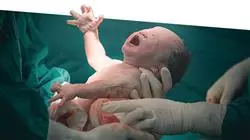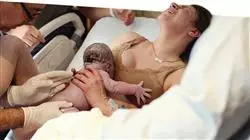University certificate
The world's largest faculty of medicine”
Introduction to the Program
Thanks to this Postgraduate diploma, you will learn about the advanced techniques for managing water births in Natural Birth Units”

In line with the growing popularity of natural childbirth in recent years, a large number of hospitals have invested in creating or enhancing their facilities dedicated to this purpose. With the goal of enabling a safe childbirth and respecting the mother's wishes, they have implemented revolutionary aquatic devices, vertical birthing chairs, and sports equipment that promote the success of the process. Therefore, specialists need to have an in-depth understanding of the operation of these units and all their tools to avoid falling behind in the evolution of their field.
In response to this situation, this academic institution has chosen to create this program, through which professionals will delve into the most cutting-edge aspects of Natural Birth Units. Over 6 months of intensive learning, you will learn about the operation of modern private rooms and common areas or identify the safety infrastructure required to ensure the patient's well-being. You will also discover the criteria for water immersion during childbirth or delve into the intricacies of home birthing.
Thanks to the fact that this program is delivered through a comprehensive 100% online methodology, students can create their own study schedules for highly efficient learning. Similarly, this Postgraduate diploma has been designed by leading specialists in the field of Natural Birth, who have decades of professional experience in this area. As a result, the knowledge you receive will have excellent practical utility in your daily practice.
Throughout this academic period, you will be able to delve into the safety infrastructure required by Natural Birth Units to ensure the well-being of both the mother and the child”
This Postgraduate diploma in Natural Birth Units contains the most complete and up-to-date scientific program on the market. The most important features include:
- The development of practical cases presented by experts in Neonatology
- The graphic, schematic, and practical contents with which they are created, provide scientific and practical information on the disciplines that are essential for professional practice
- Practical exercises where self-assessment can be used to improve learning
- Its special emphasis on innovative methodologies
- Theoretical lessons, questions to the expert, debate forums on controversial topics, and individual reflection assignments
- Content that is accessible from any fixed or portable device with an Internet connection
With this qualification, you will gain a deeper understanding of the operation of modern private rooms and common areas in Natural Birth Units”
The program’s teaching staff includes professionals from the sector who contribute their work experience to this educational program, as well as renowned specialists from leading societies and prestigious universities.
The multimedia content, developed with the latest educational technology, will provide the professional with situated and contextual learning, i.e., a simulated environment that will provide immersive education programmed to learn in real situations.
This program is designed around Problem-Based Learning, whereby the professional must try to solve the different professional practice situations that arise during the academic year This will be done with the help of an innovative system of interactive videos made by renowned experts.
The Relearning method provided by this Postgraduate diploma promotes a personalized learning experience tailored to your academic needs"

Stay updated alongside specialists who are actively practicing in the field of natural childbirth"
Why study at TECH?
TECH is the world’s largest online university. With an impressive catalog of more than 14,000 university programs available in 11 languages, it is positioned as a leader in employability, with a 99% job placement rate. In addition, it relies on an enormous faculty of more than 6,000 professors of the highest international renown.

Study at the world's largest online university and guarantee your professional success. The future starts at TECH”
The world’s best online university according to FORBES
The prestigious Forbes magazine, specialized in business and finance, has highlighted TECH as “the world's best online university” This is what they have recently stated in an article in their digital edition in which they echo the success story of this institution, “thanks to the academic offer it provides, the selection of its teaching staff, and an innovative learning method aimed at educating the professionals of the future”
A revolutionary study method, a cutting-edge faculty and a practical focus: the key to TECH's success.
The most complete study plans on the university scene
TECH offers the most complete study plans on the university scene, with syllabuses that cover fundamental concepts and, at the same time, the main scientific advances in their specific scientific areas. In addition, these programs are continuously being updated to guarantee students the academic vanguard and the most in-demand professional skills. In this way, the university's qualifications provide its graduates with a significant advantage to propel their careers to success.
TECH offers the most comprehensive and intensive study plans on the current university scene.
A world-class teaching staff
TECH's teaching staff is made up of more than 6,000 professors with the highest international recognition. Professors, researchers and top executives of multinational companies, including Isaiah Covington, performance coach of the Boston Celtics; Magda Romanska, principal investigator at Harvard MetaLAB; Ignacio Wistumba, chairman of the department of translational molecular pathology at MD Anderson Cancer Center; and D.W. Pine, creative director of TIME magazine, among others.
Internationally renowned experts, specialized in different branches of Health, Technology, Communication and Business, form part of the TECH faculty.
A unique learning method
TECH is the first university to use Relearning in all its programs. It is the best online learning methodology, accredited with international teaching quality certifications, provided by prestigious educational agencies. In addition, this disruptive educational model is complemented with the “Case Method”, thereby setting up a unique online teaching strategy. Innovative teaching resources are also implemented, including detailed videos, infographics and interactive summaries.
TECH combines Relearning and the Case Method in all its university programs to guarantee excellent theoretical and practical learning, studying whenever and wherever you want.
The world's largest online university
TECH is the world’s largest online university. We are the largest educational institution, with the best and widest online educational catalog, one hundred percent online and covering the vast majority of areas of knowledge. We offer a large selection of our own degrees and accredited online undergraduate and postgraduate degrees. In total, more than 14,000 university degrees, in eleven different languages, make us the largest educational largest in the world.
TECH has the world's most extensive catalog of academic and official programs, available in more than 11 languages.
Google Premier Partner
The American technology giant has awarded TECH the Google Google Premier Partner badge. This award, which is only available to 3% of the world's companies, highlights the efficient, flexible and tailored experience that this university provides to students. The recognition as a Google Premier Partner not only accredits the maximum rigor, performance and investment in TECH's digital infrastructures, but also places this university as one of the world's leading technology companies.
Google has positioned TECH in the top 3% of the world's most important technology companies by awarding it its Google Premier Partner badge.
The official online university of the NBA
TECH is the official online university of the NBA. Thanks to our agreement with the biggest league in basketball, we offer our students exclusive university programs, as well as a wide variety of educational resources focused on the business of the league and other areas of the sports industry. Each program is made up of a uniquely designed syllabus and features exceptional guest hosts: professionals with a distinguished sports background who will offer their expertise on the most relevant topics.
TECH has been selected by the NBA, the world's top basketball league, as its official online university.
The top-rated university by its students
Students have positioned TECH as the world's top-rated university on the main review websites, with a highest rating of 4.9 out of 5, obtained from more than 1,000 reviews. These results consolidate TECH as the benchmark university institution at an international level, reflecting the excellence and positive impact of its educational model.” reflecting the excellence and positive impact of its educational model.”
TECH is the world’s top-rated university by its students.
Leaders in employability
TECH has managed to become the leading university in employability. 99% of its students obtain jobs in the academic field they have studied, within one year of completing any of the university's programs. A similar number achieve immediate career enhancement. All this thanks to a study methodology that bases its effectiveness on the acquisition of practical skills, which are absolutely necessary for professional development.
99% of TECH graduates find a job within a year of completing their studies.
Postgraduate Diploma in Natural Birth Units
Birthing care in natural childbirth units has become one of the preferred options for women seeking a more welcoming, less medicalized environment with greater autonomy in the birthing process. In our Postgraduate Diploma in Natural Childbirth Units program, we focus on offering comprehensive training in natural childbirth care. From the perspective of the humanization of obstetric care, we will teach you how to provide respectful and empathetic accompaniment to women throughout the process, as well as how to identify warning signs and the need to refer to more specialized care if necessary.
The Postgraduate Diploma in Natural Childbirth Units program is designed to offer you training based on updated scientific evidence, where you will acquire skills and abilities in the care of physiological childbirth and in the management of the different situations that may arise during the process. You will be trained in the use of non-pharmacological techniques for pain relief, in the use of obstetric technology and in the promotion of early bonding between mother and newborn. In addition, you will learn to value and respect cultural, ethnic and gender diversity in obstetric care, in order to provide an inclusive and quality service to all women who rely on your care in a natural childbirth unit.







